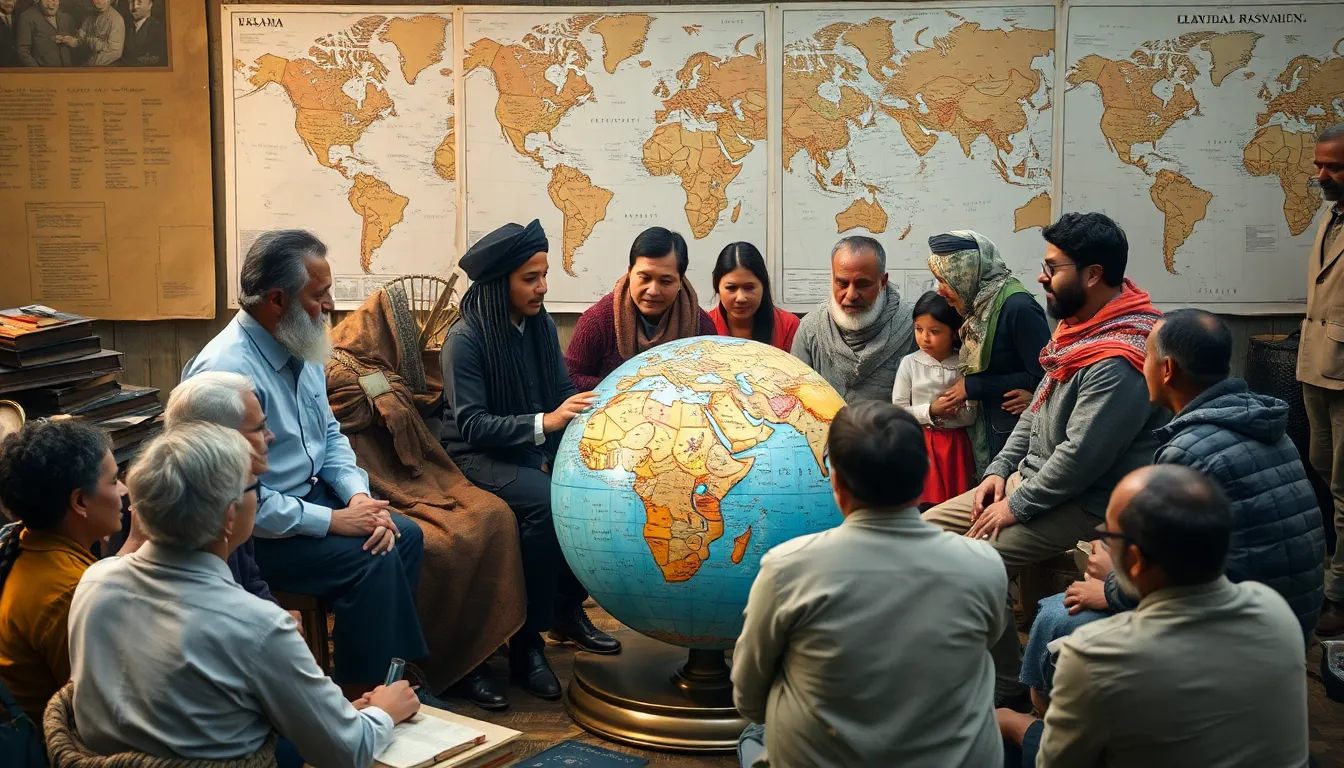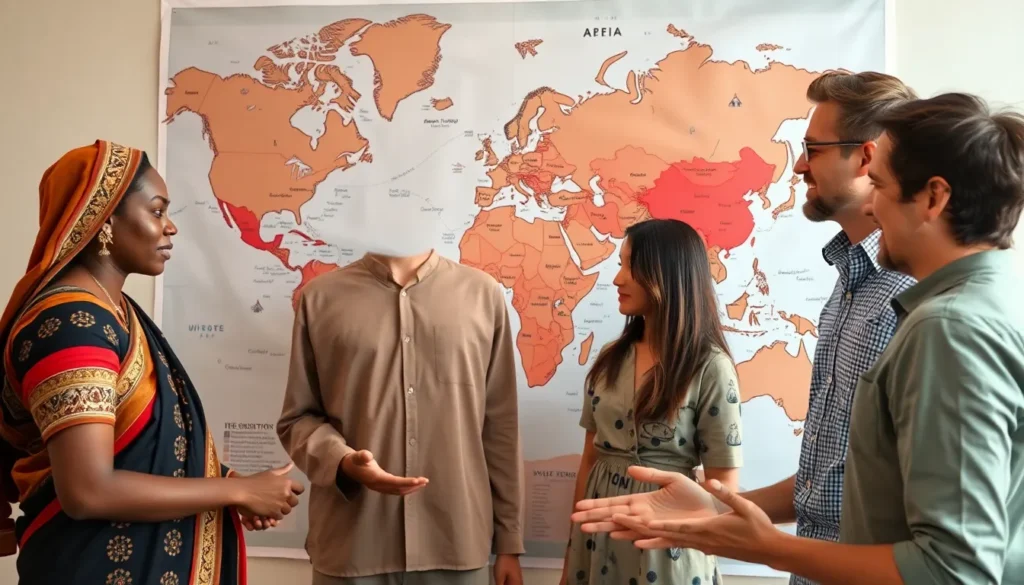Table of Contents
ToggleWorld history is a rich tapestry woven from diverse cultures, events, and ideas that have shaped humanity. Understanding this complex narrative is crucial for grasping the world today. A comprehensive world history report delves into pivotal moments and movements, revealing how they influence contemporary society.
From ancient civilizations to modern revolutions, each chapter of history offers lessons that resonate in current global affairs. By examining these historical milestones, one can appreciate the interconnectedness of nations and peoples. This report aims to illuminate significant trends and events that have defined our shared past, providing insights that are essential for navigating the future.
Overview of World History Report
World history reports present a structured examination of significant events, cultures, and ideas throughout time. These reports highlight critical periods, from the rise and fall of empires to pivotal social movements. They capture the evolution of societies and their interactions, underscoring the influence of geography, technology, and ideology.
Key Themes in World History
- Civilizations: Major civilizations such as Mesopotamia, Ancient Egypt, and the Indus Valley contributed foundational elements to human culture, including governance, religion, and trade.
- Empires: Empires like the Roman Empire and the Mongol Empire expanded territories, analogous to cultural diffusion, which shaped political and economic structures across regions.
- Revolutions: Revolutions, including the American and French Revolutions, established principles of democracy and human rights that resonate globally.
- Geopolitical Developments: Key conflicts and alliances, such as the World Wars and the Cold War, illustrate the complexities of international relations and their long-term impacts.
Methodology of Historical Analysis
- Chronological Approach: Reports generally follow a chronological sequence, allowing readers to trace developments and their consequences over time.
- Comparative Studies: Comparative analysis of different cultures and epochs highlights similarities and differences that contribute to a deeper understanding of human history.
- Interdisciplinary Perspectives: Integrating insights from archaeology, anthropology, and sociology enriches the narrative and reveals multi-faceted dimensions of historical events.
Implications for Contemporary Society
Understanding historical trends enables societies to learn from past experiences. Reports provide analytical frameworks to assess current global issues, including economic inequalities, cultural conflicts, and environmental concerns. By recognizing patterns and historical foundations, individuals and communities can navigate challenges more effectively.
World history reports serve as essential resources for education, policy-making, and fostering global citizenship. They underscore the interconnectedness of peoples and civilizations, advocating for a more informed and collaborative future.
Key Themes in World History

Key themes in world history reveal the intricate tapestry of human civilization. These themes highlight the significant political, economic, and social dynamics that have shaped societies across time.
Political Developments
Political developments serve as cornerstones in the narrative of world history. Notable examples include the formation and dissolution of empires, such as the Roman Empire and the Persian Empire. Revolutions, like the American and French Revolutions, further transformed governance and civil rights, spreading ideals of democracy and liberty globally. The emergence of nation-states in the 19th century marked a shift towards organized political structures, influencing diplomacy and international relations. Furthermore, key geopolitical events like World Wars I and II reshaped borders and alliances, profoundly impacting global power dynamics.
Economic Trends
Economic trends reflect the evolution of trade and industry throughout history. The rise of mercantilism in the 16th century established early global trade networks, leading to prosperity for many nations. The Industrial Revolution in the 18th century marked a significant shift toward mechanized production and urbanization, resulting in increased productivity and societal changes. Globalization in the late 20th century interconnected economies worldwide, leading to both opportunities and challenges, such as economic inequalities and environmental concerns. Understanding these trends provides insight into historical and contemporary economic relations.
Social and Cultural Changes
Social and cultural changes illustrate the transformative power of ideas and movements. Major cultural milestones include the spread of religions like Buddhism, Christianity, and Islam, which forged collective identities and ethical frameworks. Social movements, such as the abolition of slavery and the civil rights movement, advanced human rights and social justice principles. Cultural exchanges spurred by exploration and migration facilitated the sharing of ideas, art, and technology, enriching societies. The digital revolution in recent decades has transformed communication and access to information, influencing contemporary cultural landscapes.
Major Civilizations Highlighted
World history reports emphasize the significance of major civilizations in shaping human development. The contributions and events from these civilizations set foundational elements for modern society.
Ancient Civilizations
Ancient civilizations laid the groundwork for contemporary culture and governance.
- Mesopotamia: Considered the “cradle of civilization,” Mesopotamia introduced writing, law codes, and early urbanization. Its innovations in agriculture and trade spurred economic growth and complex societal structures.
- Ancient Egypt: Renowned for monumental architecture and a centralized government, Ancient Egypt contributed advancements in mathematics, medicine, and art. The civilization’s religious practices and hieroglyphics provide invaluable insights into human belief systems.
- Indus Valley Civilization: Notable for its urban planning and advanced drainage systems, the Indus Valley Civilization demonstrates early achievements in architecture and trade networks. Its script remains undeciphered, highlighting the mysteries surrounding this civilization.
- Ancient China: With dynasties such as the Shang and Zhou, Ancient China pioneered innovations like paper, gunpowder, and compass technology. Its philosophical concepts, such as Confucianism and Daoism, continue to influence societies globally.
Modern Nations
Modern nations reflect the evolution of human governance and cultural exchange.
- United States: The U.S. emerged from the American Revolution, establishing democratic principles and rights that inspire similar movements worldwide. Its economic model emphasizes innovation and globalization, transforming global trade patterns.
- France: The French Revolution challenged monarchical rule, promoting ideals of liberty and equality. France’s influence on arts, culture, and political thought underpins much of modern Western society.
- China: Modern China’s rapid industrialization and economic reform since the late 20th century position it as a global powerhouse. Its unique blend of communism and capitalism shapes international relations and trade dynamics.
- India: As the world’s largest democracy, India showcases a rich tapestry of cultural diversity and economic growth. Its historical legacy and modern technological advancements highlight the significance of fostering inclusive growth.
Significant Events and Milestones
Significant events and milestones in world history shape the course of nations and cultures. Key occurrences, especially wars and treaties, demonstrate their profound impact on society and international relations.
Wars and Conflicts
Wars and conflicts have catalyzed crucial changes throughout history. Key conflicts include:
- World War I (1914-1918): This global conflict reshaped borders and initiated the League of Nations, laying groundwork for international diplomacy.
- World War II (1939-1945): The deadliest conflict led to significant geopolitical shifts, including the formation of the United Nations and the onset of the Cold War.
- The Cold War (1947-1991): This ideological conflict between the United States and the Soviet Union saw numerous proxy wars, influencing politics worldwide and fostering an arms race.
- The Vietnam War (1955-1975): This conflict highlighted anti-war movements and altered American foreign policy, emphasizing the cost of military intervention.
- The Gulf War (1990-1991): This conflict showcased a coalition of nations uniting against Iraq’s invasion of Kuwait, emphasizing the role of international coalitions.
Each war influenced political boundaries, societal norms, and global power dynamics.
Treaties and Alliances
Treaties and alliances mark pivotal turns in history, often resolving conflicts and establishing new relationships. Notable treaties include:
- Treaty of Versailles (1919): This treaty officially ended World War I and imposed reparations on Germany, contributing to future tensions.
- NATO Treaty (1949): The North Atlantic Treaty Organization established a military alliance that aimed to deter Soviet aggression and solidified collective defense among member nations.
- United Nations Charter (1945): The UN Charter created a framework for international cooperation, promoting peace and security after World War II.
- Treaty of Tordesillas (1494): This treaty divided new lands between Spain and Portugal, influencing colonization patterns.
- Paris Agreement (2015): This international accord addresses climate change, demonstrating a collective effort to combat global environmental issues.
Each treaty and alliance reflects the priority of diplomacy and cooperation in shaping modern international relations.
The Role of Technology in Shaping History
Technology has played a pivotal role in shaping historical events and societal transformations. Innovations in tools, methods, and communication have often influenced the course of civilizations and their interactions.
Communication Technologies
- Invention of Writing: The emergence of writing systems in ancient Mesopotamia and Egypt facilitated record-keeping, legal systems, and the exchange of ideas.
- Printing Press: The invention of the printing press in the 15th century allowed for mass production of texts, which accelerated the spread of knowledge and contributed to the Renaissance and Reformation movements.
- Telegraph and Telephone: The telegraph in the 19th century revolutionized communication over long distances, enhancing trade and diplomacy, while the telephone improved personal and business communication in the 20th century.
Transportation Technologies
- Wheel and Road Construction: The invention of the wheel and the development of extensive road networks in ancient civilizations enabled easier movement of goods and armies, facilitating trade and conquest.
- Steam Engine: The application of the steam engine in the 18th century powered the Industrial Revolution, revolutionizing transportation through railroads and steamships, which transformed economies and societies.
- Automobile and Air Travel: The introduction of automobiles and airplanes in the 20th century reshaped urban planning, created new industries, and revolutionized global travel and trade.
Military Technologies
- Gunpowder: The introduction of gunpowder in warfare significantly altered military strategies and power dynamics, leading to the rise and fall of empires.
- Nuclear Weapons: The development of nuclear weapons introduced a new era of warfare, altering international relations and igniting discussions on arms control and global security.
- Cyber Warfare: The rise of the internet has given birth to cyber warfare, impacting national security and international relations in the 21st century.
Economic Technologies
- Agricultural Innovations: The Green Revolution in the mid-20th century introduced high-yield crops and fertilizers, transforming food production and addressing global hunger.
- Information Technology: The boom in information technology and the internet has reshaped economies, influencing everything from commerce to communication, and creating new forms of social interaction.
- Automation and AI: Advances in automation and artificial intelligence are currently reshaping labor markets, altering production processes, and raising discussions about the future of work.
Social Technologies
- Social Media: Platforms like Facebook, Twitter, and Instagram have changed social dynamics, influencing public opinion, activism, and personal relationships.
- Healthcare Innovations: Technological advancements in medicine, such as vaccines and telemedicine, have transformed public health responses and improved life expectancy.
- Environmental Technologies: Innovations in renewable energy technologies aim to counter climate change and promote sustainable development, reflecting a growing awareness of ecological impacts.
Technology continues to influence world history by catalyzing social changes, transforming economies, and reshaping political landscapes. Each advancement creates new opportunities and challenges, weaving into the global narrative of civilization’s development.
Understanding world history is crucial for grasping the complexities of today’s global landscape. The intricate connections between past events and contemporary issues highlight the importance of learning from history. Each civilization and movement contributes to the ongoing narrative that shapes societies.
As technology continues to evolve and influence human interactions, the lessons drawn from historical analysis remain relevant. By examining significant events and cultural exchanges, societies can foster a more informed citizenry. This knowledge not only enriches individual perspectives but also promotes collaboration in addressing global challenges. Embracing the lessons of history empowers nations to navigate the future with insight and purpose.







